|
[Previous Page]
1893.
――♦――
PERPLEXITY OF THE NEW ZEALANDER IN LEEDS—THE STREET
WITH THE NATIONAL NAME—PUBLIC TASTE IN STORES—DEATH OF A FOREMOST
ADVOCATE—FIRE AND FLOOD—CRICKET FIELD HABITATIONS—THE LEEDS
MUSICIANS AT THE CRYSTAL PALACE—TRADE DEPRESSION BUT NO PROFIT
DEPRESSION.
SO many memorial
stones have been laid by the Leeds Society that when Macaulay's New
Zealander comes to study the ruins of Leeds he will be surprised—if
excavations are being made—at the number of foundation stones laid
by some ancient and extinct colony, historically known as
Co-operators. He will conclude they were an opulent people
which came over with the Romans, settled in Leeds, and built
numerous palaces there.
Another Store of no mean pretension is in hand. The
memorial stone of the new Central Stores in West Albion Street was
laid on Saturday, May 8th, by J. W. Chapman, chairman of the Grocery
Committee. At the meeting held afterwards, Mr. Chapman
received a testimonial and a handsome gold watch. Mrs. Chapman was
presented with a beautiful tea and coffee service. Travellers from
abroad speak of "landing on the shores of Albion." The inhabitants
are Albioners, a prettier and more resonant name than "Britishers." Albion Street is the most national name in the city, and the most
famous of the stores of Leeds are destined to be found there.
One thing which will strike anyone now who shall visit the stores of
city or suburbs will be their graces of structure in many
conspicuous instances, and their architectural adaptation to local
environment—always increasing the attractions of the district in
which they are placed. The numerous estates the Society has bought
and laid out—the wide roads they have made—the brightness and
convenience of the houses they have erected—excel those which any
People's Society have put up in any part of the land.
A loss took place this year, which store and city deplored, in the
death of Mr. William Bell, whose name had been a household word
among co-operators "far and near" for years. References to him in
these pages have been frequent. Further of him will be found in
Memorable Workers. Fire has tried its hand twice at the mill, and
now the flood came in October, doing damage to the coal department,
and a sum of £174 has had to be paid for loss occasioned by the
breaking away of one of the Society's boats. Had the coal wharf flood
discharged itself on the mill fire there would have been economy in
it; but the elements are not economists.
An eligible piece of land has been purchased near to Strawberry
House Store, with a good frontage into Tong Road, for building shops
upon. Blocks of cottages are commenced on the Ivy House Estate, and
16 houses on the Cricket Field Estate. Cricket is good, and, next to
that, are good habitations for the people, and the Society has
erected them.
In continued controversy upon the Wholesale, the Co-operative Union
and the Wholesale Society are said to be, and are believed by some
to be, one and the same. They are regarded as practically one. More
distinctiveness might be to the advantage of both. The purchases
from it this (December) half year were £18,681.
At the Crystal Palace Festival this year the Leeds Choir proved to
be the best in competition with six other choirs. The Musical Herald
said "some of the singing was of a singularly high standard"—a
singular word to use in a vocal criticism. The singing had unusual
excellence. The Herald adds: "The first winners (Leeds) receiving
as many as 93 marks." The ascendancy of the Leeds musicians has been
so often proved that the vast audience at the Palace, which witness
and cheer them, always expect Leeds to win.
The profits earned in the June portion of the year were £54,376. A
bright report for one of the dullest half years known. It is the
cardinal advantage of a co-operative profit bank that members who
have the good sense to buy at the stores can draw money out, who
never put anything in. Very useful in times of distress.
Mr. Thornton, president, reports in the December half year that,
after passing through one of the most prolonged and trying
industrial crises of modern times, the sales have amounted to
£410,386. The net profit being £48,460, making a total profit of
£102,836, not a bad sum to make in bad times. A surplus of £1,000
left over from last account was brought forward, and made £49,460
for distribution among members. The number of members at the end of
December stands at 31,012.
Education was accorded the first half year £407. 16s. 6d.; the
second half year £363—or £770 for the year.
1894.
――♦――
THE AUXILIARY STORES―ARCHITECTURAL
TASTE ECONOMY IN BUSINESS―TWO
ESSENTIALS OF A CO-OPERATIVE STORE―OBLIVIOUSNESS
OF ARCHITECTS―THE DISTINCTION OF
THE DAY―PERIPATETIC SHOPS-WHAT MR.
MAXWELL "HAS NEVER SEEN"-THE STRAWBERRY STORE-A MEAT EMPLOYEES'
UNION―A CLEARING HOUSE FOR LATENT
MEMBERS―LUCID BALANCE SHEETS―GREAT
GROWTH OF THE SOCIETY―NO
EDUCATIONAL INSOLVENCY NOW.
THIS is a great
year, in which the Leeds Society establishes itself on the heights
where it overlooks all the societies on the plains of the world.
The Society has for years been climbing to its present elevation,
and is likely to ascend still higher.
The chief event of 1894 is the opening, September 1st, of the
new auxiliary stores in Albion Street, with a frontage worthy of the
central stores on the east side, opened in 1884. In the
adjoining plate the reader will see the imposing aspect of the new
structure. The directors had not been intimidated by
parsimonious criticism from giving another sky line to Albion
Street, which does the eye good to look upon. There is a
wasteful economy as well as a wise one. The architect paid the
members the compliment of designing a store with which he was
willing his own name might be associated. It should not be
forgotten that members who own a building of taste share the credit
of it. In struggling days when the plainest building can be
ill afforded, cleanliness and light are all that can be commanded.
But when a society makes substantial profits, some beauty in its
premises is a perpetual advertisement which pays good interest.
Every tradesman knows that brightness usually means custom.
Besides, what right have co-operators, who aim at public
improvement, to put up dismal buildings? The structures of
poverty are dreary by their nature; the structures of success should
be the outward and visible sign of inward opulence. It is the
logic of trade.
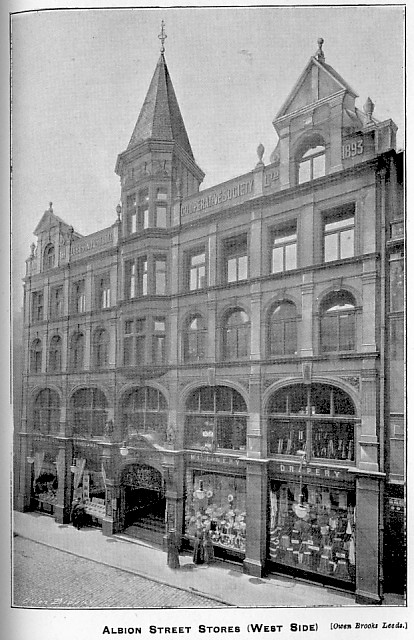
The new stores cost £20,000 exclusive of the
site. The frontage in Albion Street is 80 feet, extending back
104 feet to Upper Mill Hill, covering a total area of 1,000 yards.
It is to be the emporium of furniture, drapery, millinery, dress and
mantle making. The top floor is a tailors' workroom. All
the workrooms are lofty, light, and well ventilated. The
building is lighted throughout with electricity. The floors
are supported by iron columns with English steel and iron beams and
girders, and each room is, as far as possible, fireproof. The
ceilings, which are lofty, are panelled. Hydraulic hoists
convey the goods to and from the several floors. No facility
modern science can supply, and no grace which joiner or carver can
impart, are wanting anywhere.
Adequate light and ventilation are two things which an
architect may—remembering what so often occurs, one may say
will—entirely forget, unless specially part of his instructions.
There is no important hotel in London which has not now a portico
enabling visitors to alight without being drenched in a storm.
But not one was built with that convenience, nor was a portico ever
in the architect's mind. Law courts are built in which it is
difficult to hear anything, as is well known in Liverpool and
elsewhere, although life and death depends upon the audibility of
evidence. The object for which a place is built seldom occurs
to the architect, and should be made known to him. In a famous
co-operative town no purchaser is sure of the excellence of what he
buys, by reason of want of light. In another, the working
girls will not live out half their days for want of better air.
Generally, co-operators have spent considerable sums to ensure light
and health, and have succeeded. All the new stores of Leeds
which I saw were marvels of space, of loftiness, of light, and of
good ventilation.
At midday Mr. Lionel Thornton, the president, received from
Mr. B. Hollings the silver key with which to open the premises.
Mr. J. Tetley, Mr. J. W. Fawcett, secretary, Mr, J. C. Malcolm,
solicitor, Mr. Walter S. Braithwaite, the architect, and the
directors and officials were present. Immediately the building
was open it was thronged with a crowd of purchasers, and the
assistants were busily occupied selling all day. The space and
facilities of the various salerooms make purchasing not only easy
but a pleasure. An immense showroom on the lower floor enables
the visitor to see everything at once. A hall in the Arabian
Nights may surpass it in magical beauty but not in usefulness, or
modern trade splendour. It is rare to find in the most notable
showroom one affording such an uninterrupted view. The
directors, officials, contractors, solicitor, and architect all had
luncheon at Brayshay's Restaurant, Bond Street, where speeches were
made and amenities shown to architect, contractors, and workmen.
Still the distinction of the day was the great procession.
Vehicles and vans went through the town laden with happy occupants.
Peripatetic grocers' shops, tailoring departments, brushes, drapery
goods, joinery, doors, windows, abattoir produce, were again the
surprise and delight of the streets. Two bullocks were drawn
in the cavalcade, wondering very much what it was all about. A
blazonry of mottoes, bannerettes, and information as to the sales
and profits—which could be read on the different vehicles—amazed
Leeds more than it had been before. The press testified to the
excitement and admiration of the city produced by the famous
display.
Tea was provided on a large scale in the People's Hall and
also in the Crypt of the Mechanics' Institute. In the evening
a public meeting was held in the Coliseum, at which the Mayor (T. R.
Leuty) presided. Speeches were made by the Mayor, Mr. W.
Maxwell, Mr. J. W. Fawcett, Mr. E. O. Greening, and Mr. J. Dockray;
Mr. Abraham Greenwood and Mr. George Thomson were also present.
Mr. Maxwell said:
"During fifty years no movement
had made greater progress than co-operation, unless it was
temperance, and temperance was a sister movement. The
temperance movement had been greatly aided by the co-operative
movement. He had never known a working man build up with one
hand at the co-operative store, and tear down with the other at the
public-house."
Who knows that some project may not be started for
co-operators to turn brewers, and flood the Wholesale with barrels
of beer. Then what Mr. Maxwell "has never seen" will come
true. A co-operative society of fuddlers would be a new thing,
and if they were not that way given themselves their interest would
be fuddling, which does not seem desirable.
In April this year the Hunslet (Church Street) Stores were
opened. It was March, 1859, when stores were first established
there, but the premises have been rebuilt, and a very handsome pile,
which, as the reader sees, adds gaiety to the neighbourhood. There
are many dull parts of Leeds where it would be to the interests of
the inhabitants to invite the co-operators to open stores in their
midst, to brighten up the neighbourhood and introduce commodities
which could be trusted, sold on premises which are refreshing to see
and to visit.
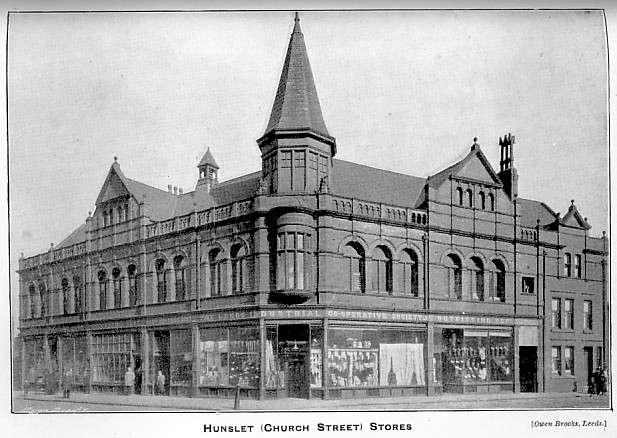
One of the most alluring names in summer months
is a Strawberry House Store, situated in Armley. In front runs Tong
Road, and the side street is called Strawberry Lane. This store was
opened in January, 1882, but new premises were built and opened in
November, 1894. A gayer business frontage is seldom to be met with,
and it is, as the reader can judge, as alluring as its name. It is
of no mean extent. Being but two storeys high, it is easy to ascend
in search of special goods should not the lower windows with their
affluent variety contain them.
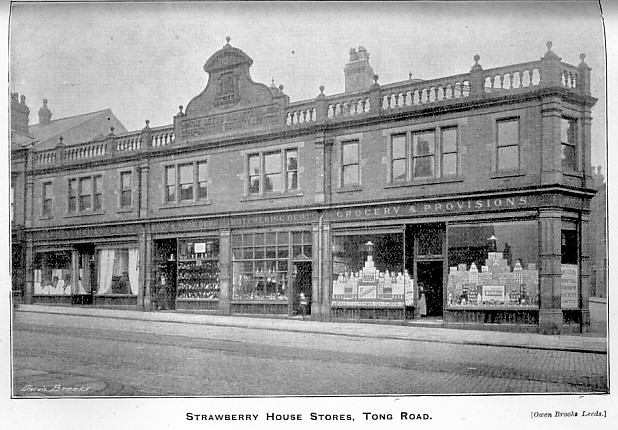
A meat-sellers' employees' association has been formed, which is
likely to be prosperous and useful. It need not be hostile. All
groups or classes of persons have their own views and interests,
which can be better made known and better dealt with when
collectively thought out and agreed upon. Similar associations have
long been in existence in connection with the employees of the
grocery, drapery, and other departments.
The number of members struck off from time to time would make the
fortune of many a store. Every society has a number of nominal
members who are well removed from their books, but might prove good
members elsewhere. There seems an opening for a Stores Clearing
House where purchasers latent in one store might be most active in
another. Persons who have once joined a store and have ceased to
support it are an interesting study. If they do not return to the
right path it is instructive to propagandists to know why they left
it.
The low price at which flour has been selling for some time has made
a difference in the turnover of the mill. New purifying machinery is
required, which will improve the flour and economise the cost. Better accommodation has had to be supplied by extensions and
erections in several productive departments. Plans are being
prepared for twenty-six additional houses on the Cricket Field
Estate, and twenty-four on the Linden Estate. With the exception of
excavating, slatering, and plastering, the whole work is carried
out by the Society's own building department. Two new stores have
been opened, one in Tong Road and one in busy Idle. A new store at Swinnow is progressing. This Society will soon, like Alexander, have
to inquire for new lands to conquer—or otherwise discover new
estates to purchase and build upon.
An essential feature in a commercial narrative is to show that the
business is conducted on sound principles—has concurrent
depreciation of its property provided for—has a prudent and
sufficient reserve fund—and makes money. Therefore the history of
every year, whether brief or long, shows what the gain is. Though
the depressed condition of trade for the past twelve months has told
somewhat upon the business of the store, the sales for the June half
year have amounted to £420,987, and the net profits to £56,347. The
president advises the members "to take a cheerful view," which they
can certainly well afford to do. There never was occasion for
misgiving—either on account of business which constantly recovers
itself and increases, or on account of ambiguity in financial
reports by obscurity or omissions. The balance sheets are entirely
lucid and complete.
The December half year balance sheet reports the sales at £413,582. Each balance sheet always contains a paragraph in this form:—"The
net profit for the half year, after providing for all expenses of
production and distribution, and allowing a sum (£8,091 this half
year) for interest upon capital and (£6,772, or whatever the amount
may be) for depreciation of fixed stock, land, and buildings,
according to rule, amounts to £51,570." This is the circumstantial
way in which the item of profit is always stated. This half year, as
there were £1,000 of profit standing over, there were £52,570
distributable among members. Members' share capital amounts to
£396,976, being an increase of £23,896 over the amount of twelve
months ago.
The June half year awards to education £422, the December period
£386—in all £808.
Among other divisions of business we now see a bold headline in the
Record, "Educational Department." Reports of the Educational
Committee now show jubilency (if one may say so without being
supposed to refer to Jubilee Day) instead of disconsolate
insolvency. They have a certain income which enables them to give
knowledge, pleasure, and recreation at discretion.
1895.
――♦――
CONSTITUTIONAL DISSATISFACTION—RESPONSIBILITIES OF
POPULARITY—"THE LEEDS RESOLUTION"—DIES BY ITS OWN HAND—DISTINCTION
OF THE LEEDS MUSICIANS—NEW STORES OPENED, NEW MEMORIAL STONES
LAID—ANOTHER WONDERFUL YEAR.
THERE are always
some persons in every party with whom dissatisfaction is
constitutional. Discontent is their vocation. They
resemble the imaginary invalid who likes to be thought unwell, and
who dismisses any doctor who has the imprudent candour to tell him
there is nothing the matter with him. This kind of person is
in every co-operative society, whose sole happiness consists in the
belief that there is "something wrong"—who disagrees with
everything, and if you did not contradict him he would die.
The most courteous is obliged to disagree with them in order to
maintain the full strength of the society. There is only one
class of persons sillier than they—those who are discouraged because
the irreconcilables are not contented. The bolder and more
sensible kind of members are more indebted than they know, to these
misgiving allies. When the day of triumph comes it is seen how
valiant has been the wise persistency of members and managers who,
despite the chronic alarmists, have brought the great prosperity to
pass.
Popularity has its advantages and also responsibilities.
Its advantage is that new projects come before it, its
responsibility is in giving heed to them. The alertness and
enterprise of the Leeds Society has long produced a popular
impression in its favour. If a stranger comes to England with
some project he believes will be useful, but which needs a live
society to test it, he instinctively turns to Leeds, and to nowhere
else, as the most likely place to give new thought—which can make
itself plain—a hearing. At Congress, a resolution brought
forward by the Leeds Society commands attention. The
resolution it brought forward at the recent Huddersfield Congress
has been known ever since as the "Leeds Resolution." No other
motion is known by the name of the city whence it originated.
On that occasion Mr. B. Hollings moved a resolution for further
development of co-operative production, and that a fund be raised to
assist partnerships among workers. It was suggested by the
writer that the word "co" be prefixed to the word partnership, which
was accepted, but not officially reported. It was left to the
Central Board, whose policy is opposed to the motion, to take the
management of the fund, which thus died by its own hand. Had
the employment of the fund, to which Leeds would have been the chief
contributor, been placed in the hands of the known friends of labour
in that Society, the resolution had borne fruit. The poet's
counsel to workmen is―
|
Make ye sure to each his own,
That he reap where he has sown. |
If a workshop resolution does not mean this, it does not matter what
it means. It was courteous and well intending of the Leeds
delegation to give the Central Board the opportunity of increasing
its influence, by proposing to place this fund in its hands; but the
Leeds initiative will not perish though their resolution has.
In 1881, when the Congress met in Leeds, the illustrations in
the handbook then issued consisted with one exception of public
buildings of the city. In this Jubilee handbook the
diversified illustrations of buildings are those with which the
co-operators have adorned Leeds. It does not need to borrow
from the town.
The December number of the Record has the charm of a
coloured wrapper; when open, it begins straightway with matter of
interest, instead of advertisements, which now appear on the
wrapper. This is an improvement, since some or relevant
leaderette arrests the reader's attention.
Mr. Arthur Brownfield lectures this year, in the People's
Hall, on the "Co-operative Commonweath;" Mr. Geoffrey Drage (now M.P.)
discourses on "Co-operation and Socialism." The Women's Guild
hold their fourth annual meeting. The various classes they have set
up for instruction in domestic arts, which men never think of and
could not do so much in that way if they did, show the great utility
of the Guild, which does not know its own power yet.
Whenever the Leeds musicians come to the Crystal Palace now they
take the chief prize. Indeed, the vast audience in front of the
orchestra, before whom the announcement of the winners in the choir
competition is made, always expect to see Leeds stand first, and it
does. The Record reports that "the Leeds Co-operative Choral Society
carries away the first prize at the Crystal Palace, conducted by
Stephen Hirst, pianoforte instructor at Queen's Road Board School.
This choir has now obtained honourable mention a first, a second,
and a first prize consecutively." In many ways we knew that there
was leadership in Leeds, which might spell its name with an a in
place of the second e.
The memorial stone of the new boot factory has been laid. A piece of
land has been bought in Lodge Lane, Beeston Hill, for new stores. A
block of old cottages, fronting Burley Road, has been bought to
erect new stores upon. Capital in hand is so large that the
directors decide to reduce the rate of interest on loan deposits
from 3 per cent to 2½ per cent.
The making of furniture has commenced. The farm is shy and has not
paid yet. Another block of ten through houses in Mitford Terrace are
proceeding.
In the June half year the sales amount to £426,616, which is an
increase of £13,034. The net profits are £53,331.
Though 441 more persons have been struck off the list of members,
the present number (June 30th) stands at 32,349. The share capital
has risen to £412,609, or more by £29,254 than at the end of June
last year.
In the December half year the sales (which embrace 2 weeks) are
£457,306, being an increase of £43,724, an increase to which all
departments more or less have contributed. The net profits amount to
£61,171.
Goods bought from the Wholesale during the December half year amount
to £21,254, and from other co-operative sources, £10,166.
The share to education in June is £399; in December, £458, being a
total for the year of £857. As this item grows with the growth of
the Society's prosperity, every member has pride in belonging to a
cause which unites intelligence and industry.
This is a wonderful year—nearly £884,000 of sales, more than
£114,000 of profit, and upwards of £800 for education.
1896.
――♦――
REVELATIONS OF INDUSTRIAL PHOTOGRAPHY—THE FIRST FLOUR
SHOP—HALF A CENTURY OF PROGRESS—A JUBILEE CONTEMPLATED—MARSHALL
STREET BUILDINGS—THE PARALLELOGRAM COME AT LAST—NEW FACTORIES
BEGAN—THE DEBATING CLASSES IN OPERATION—ADDITIONS TO MILL AND
ABATTOIR NEW ESTATES BEING PURCHASED—NEW STREETS AND TERRACES BEING
BUILT—PRODIGIOUS BUSINESS—ANOTHER MARVELLOUS YEAR.
NOBODY dreamed
when photography was first invented that it would ever become a
source of revelation greater than the telescope. Now it is
found that when the most powerful instrument has brought the distant
stars near to us, clusters of worlds—not previously known or
suspected to exist—appear on the photographic plate. This
chronicle will seem to many readers unconversant with Leeds and the
co-operative capacity of the working class—like the photographic
plate of astronomy revealing the existence of unsuspected stars.
The existence of stores are revealed all along the line of fifty
years, unknown or unremembered.
The adjoining picture represents the first of the flour shop
series. The reader sees there the first flour agent's shop,
which was opened in the year 1847. There is a pleasant air of
domesticity about it. The children, who disport themselves or
romp about it, and are all the healthier and comelier for its
existence; and if we could see them face to face, prettier for being
able to obtain good flour instead of the pernicious mixture of alum
and plaster of Paris which poisoned the poor man's family 50 years
ago. Next year is the jubilee of that flour shop. There
were prophets in those days—there always have been prophets—but the
most adventurous of them never thought of predicting, and would not
have been believed if he had, that within half a century of the
opening of that humble shop on Stocks Hill, Bramley, eighty stores
would be spread over Leeds and around it, and many of them imposing
structures, some doing more business than was probably transacted in
the village of Bramley in 1847. When the right sowers get the
right seed, and sow it in the right place, the result is beyond all
human forecast.
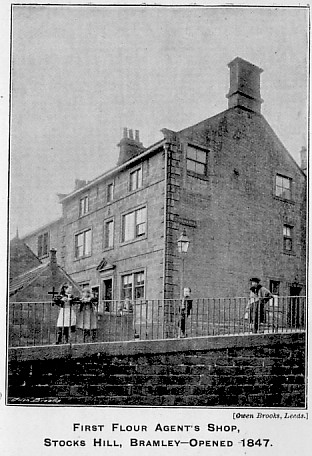
A special conference of local committees was held
to consider how the jubilee of the Society was to be celebrated.
Much interesting discussion occurred. The Board suggested a
demonstration followed by a large public meeting, and a simultaneous
publication of a handbook giving information of the vicissitudes and
progress of the Society. The recommendation of a demonstration
was adopted, as was the suggestion of a descriptive handbook.
One member proposed that £3,000 be invested as an endowment fund to
the Leeds General Infirmary, in which there should be a Co-operative
Ward, which was not ratified. One member wished to see the
endowment of thirty beds in a Convalescent Home. Other motions
were made but were not adopted, all indicating generous views,
having for their object the instruction and benefit of the public,
as well as the members.
It is time the reader had a good view of the Marshall Street
Buildings. There they are—comprising flour mill, grocery
warehouse, boot factory, drapery warehouse, bakery, stables, and
other premises. The entrance is now in David Street, the
side-street is Manor Road, whilst Marshall Street may be said to be
at the back of the premises, although the stores open into Marshall
Street.
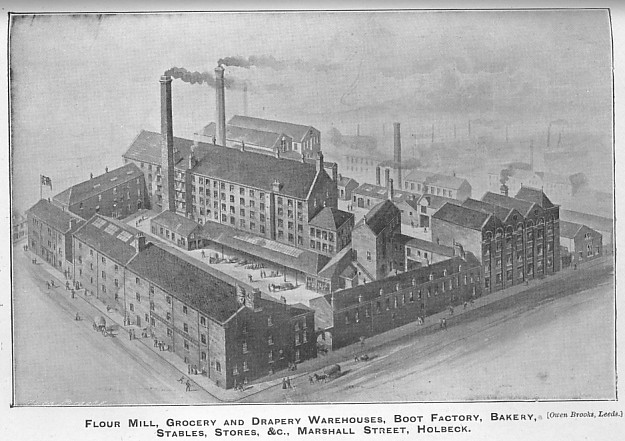
All the manufacturing energy of the Society has
lain here. Extensions of productive power lie all about the
city. But its concentration and growth began on this spot.
Here is the People's Mill—the century has seen no other like it.
It must be owned that the Marshall Street structures, as presented
in the plate, look very much like that Owen parallelogram which had
such terror in Dr. Hook's days. The plate resembles a rude
copy of Mr. Stedwell's design for Robert Owen's community, only the
Marshall Street Street plate is of an industrial, not a domestic
parallelogram.
These buildings have only been completed within the last few
months when the blacksmiths' shop was erected, and the boot factory
was completed only last year. In fact, these premises are
always being altered or extended.
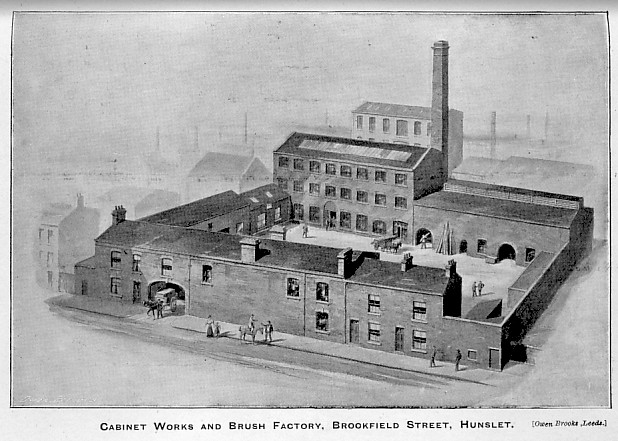
It has been found advantageous to separate the
cabinet making from the joinering, and premises in Brookfield
Street, Hunslet, have been purchased for this branch of the
business, shown in the preceding plate. There is good work to
be done in that block, though it is not so picturesque as it would
be had the Society built it.
The Mill Committee represented on the next plate have
responsible duties, upon which the prosperity of the mill and other
departments more or less depend. They have the supervision of
the mill, the abattoir, the horse-keepers, coal, ready-made and
bespoke clothing departments, so that the demands upon their
attention and judgment are many. Their duty also is to advise
with the managers of the departments over which they have
supervision, on all matters affecting the success of the business.
The committee give a pleasant impression of being entirely equal to
their work.
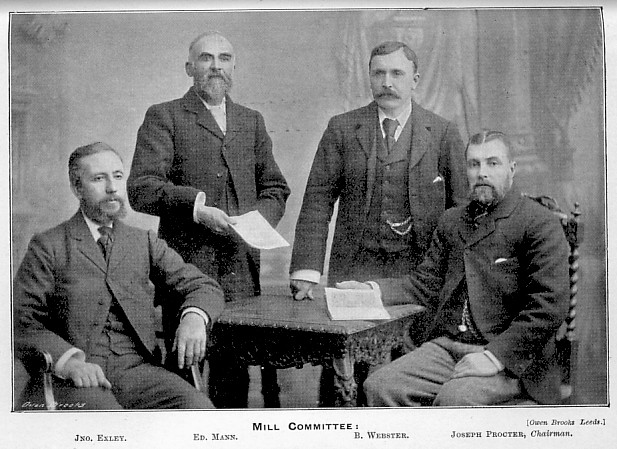
The Brudenell Grove Debating Society announce its
session of subjects. Debating societies have been the daring
projects of intellectual men for setting forth their views, and have
not met with general encouragement. In later times it has been
found that discussion not only adds brightness, but honesty to the
understanding, and that no man is entitled to speak confidently upon
any subject, and cannot be an authority upon any, unless he knows
both sides of it—and no man can know that save by debate.
Where debate is forbidden the charlatan is king.
The Board have had erected at the Society's abattoirs cold
storage rooms, indispensable for freshness of food in summer.
The storage has the same scientific completeness and conditions of
sweetness and cleanliness as have all other departments of this
great building.
A new compound steam-engine has been put down at the mill,
and the three boilers replaced with two new steel ones. The
dressmaking, which commenced eighteen months ago, is being better
arranged, and has new conveniences of special rooms for fitting.
Capital grows faster than means can be found for its safe
employment. Hence, as far as it can be well used, land has
been bought at North Street, Roundhay Road, in Hogg's Field, and
Kirkstall Road, for the enlargement of stores. Twenty-nine
cottages have been bought at Burley-in-Wharfedale and land for
twenty-one at Horsforth, and the erection of another block on the
Cricket Field has been commenced. Purchases from the Wholesale
this half year, £26,155.
Notwithstanding the reduction of the rate of interest, the
share capital has increased during the past year (June 30th)
£34,560, and now stands at £447,170. During this six months
the turnover of the Society included 43,155½
bags of flour, 472 tons of butter, 212 tons of bacon and ham, 216
tons of lard, 57 tons of cheese, 48 tons of fruit, 1,500 tons of
sugar, 500 tons of soap, 81 tons of rice, 25 tons of coffee, 51 tons
of tea, 61 tons of syrup, 41,531lbs. of tobacco, 144,704 score
potatoes, 38,468 hundreds of eggs, and 61,0121bs. of yeast; the meat
department contributed 1,666 beasts, 4,511 sheep, 82 calves, 686
pigs, and 396 lambs; the coal department, 39,193 tons of coal; the
boot and shoe department, 29,125 pairs of boots of the Society's own
manufacture, and 24,173 pairs from other sources, besides repairs to
the extent of 30,277. The only word which can describe this
volume of business is the one Sir Walter Scott puts into the mouth
of Dominie Sampson—"prodigious."
The sales in the June period of this the fiftieth year of the
Society's existence amount to £464,705, being an increase of £38,088
over the last year. The net profits were the large sum of
£63,771, which with the surplus £1,000 left over in the last account
made £64,779 available for distribution, which gave a dividend of
two shillings and tenpence in the £.
The sales for the December period of twenty-six weeks are
£492,628, being an increase of £35,321 over the corresponding period
last year, which contained twenty-seven weeks—yet the business this
half year shows increases over that period: Grocery, £20,702;
drapery, £4,244; coal, £4,867; meat, £2,819; ready-made clothing,
£874; boots and shoes, £567; furnishing, £459.
The profits of the December period were £75,540. Where
be the people now who said, if the Society added the sale of
provisions to flour, it would be mad Utopianism. Who are the
Utopians now? There is a Utopia of foolishness and a Utopia of
wisdom which ventures on untried fortune. The Leeds
co-operators have found the wiser one.
The share for education was £478 for the June period, and
£566 for the December period, making a total of £1,044.
|
|
£ |
|
Sales |
957,333 |
|
Profits |
139,312 |
|
Education |
1,044 |
Another marvellous year. These are not like the paper profits
in the prospectus of a new company, but real profits in the bank and
in the pockets of members.
1897.
――♦――
LOOKING BACKWARDS—THE FAMOUS PAST—DISADVANTAGES OF
PIONEER TIMES—TRIUMPHANT DAYS—OPPORTUNITIES OF RULE REVISING
BUSINESS AND PROGRESS THE ORDER OF THE DAY—LOSS OF AN OLD
LEADER—GENEROSITY OF THE SOCIETY—ITS SUPPORT OF CO-OPERATIVE
WORKSHOPS—FIELD CLUB STUDIES—SCENIC CHANGES PRODUCED BY CO-OPERATORS
IN LEEDS—SIX HUNDRED AND FIFTY HOUSES BUILT—THE CITY WITHIN A
CITY—WHAT 37,000 MEMBERS MEAN—THE DISTINCTION OF LEEDS-WHAT
CO-OPERATION REALLY DOES—MARVELLOUS RESULTS—A MILLION OF TRADE—ONE
HUNDRED AND FIFTY THOUSAND POUNDS OF PROFIT—THE PRESIDENT OF THE
JUBILEE.
LOOKING back at
the splendid career of the Leeds Society and its marvellous
extension, it is impossible not to wonder at the hidden capacity of
administration and device which no one suspected to exist. Not
only was it not suspected, it was denied that working men could have
these qualities. When did the higher classes show greater
courage and resource in confronting difficulties, in mastering the
conditions of one business after another with which they were
totally unacquainted? Mistakes were made, yet they were not
discouraged; losses came, yet the industrial pioneers were not
dismayed. Not like the rich, the workmen had no revenue to
fall back upon. Losses appeared to them ruin, yet they never
despaired. Those who said they knew nothing of the corn mill
business, or the calculations of the provision trade, or the risks
of manufacturing enterprise, spoke truly enough, and then gave
themselves the triumphant airs which the prophet of disaster knows
so well how to put on. Yet these working men and women never
lost heart and never turned back. If they did not know what
was necessary to success they could learn it, and provided they did
not lose heart at their inevitable mistakes, they could succeed as
others had done—and they did. Could gentlemen show more
undaunted mettle. The battle of the Society, like that of
Alma, has been won by men in the ranks. Mechanics, with all
tradition, all experience, and all the prophets of social and
commercial disaster against them, have built up the largest
co-operative society that has ever existed. Nor is the wonder
less if account be taken of the social disadvantages under which the
Leeds Pioneers laboured. They could give no dinners to people
in society who will talk anybody into repute so long as their cooks
are expert and their wines and music good. They were not
professors with salaries, nor persons of university attainments, nor
even what Lord Lytton called "superior persons," who would look down
on those above them, which contradictory quality is the way of
"superior persons"—the pioneers were flax spinners or mechanics,
working at the bench, or at the forge, or in the mill or printing
office, or at the clerk's desk. They had no friends in the
Press to write about them, who could do them good in the eyes of the
public. If any in the Press were favourable to them, they
thought very little of the corn mill enterprise, and had only a
feeble and condescending tolerance of their co-operative projects,
which were oftener denounced than commended. The pioneers and
those who have carried on the work owe all to themselves, and the
wealth of their jubilee day reads like a miracle.
The growth of this stalwart Society is as rapid and virile as
ever, and loses sight of no condition of progress. This year
Mr. James Tetley, president, took the chair at the Peoples Hall, at
a revision meeting. The rules in force are few, clear, and
simple beyond ordinary, after so many revisions. The changes made
from time to time have the marks of obviousness and necessity. It
has often been complained that rule-revising meetings never draw
large or enthusiastic audiences. That is because the members do not
understand how a bad rule may degrade them, an unwise rule frustrate
them, or a good rule exalt them. In a legal society the conditions
of progress lie in the rules. Bad ones bow the head of the society
very low, or prevent it being raised.
Business and progress are the order of the year. The output of flour
for the June half year (46,928 bags) is the largest number ever
reached, and yet it does not exhaust the capacity of the mill. It is
in the course of things now to say that new stores are being opened,
that old ones are being extended, that new land is being acquired. Now it is at Farnley and Meanwood, and an additional wharf in the
Calls has been purchased, in order to relieve the pressure at
Victoria Bridge.
Great regret was felt at the recent death of Mr. Isaac Earnshaw, who
held a high place in the affections of the Society. He had been
three times a director of the Society, president in 1889, and
succeeded the late Mr. Richard Tabbern as the labour representative
on the School Board. For a number of years he was one of the
managers of the Leeds Skyrac and Morley Savings Bank, and was
appointed delegate to the Perth Congress, but died on the third day
of the Congress to which he was unable to proceed.
The Society has always been generous to workmen needing aid through
misfortune, or in resistance to what they deemed
injustice. The total of all the gifts members have made would be
considerable. Lately, at a Conference of Local Committees, £100 were
readily proposed in relief of the Penrhyn quarrymen. When the
recommendation came before the members' meeting for confirmation,
the same was increased to £200 and carried by a large majority. A
vote of £100 was made to the Mayor's Fund for the relief of the
famine stricken in India. A further jubilee offering to the Leeds
District Nursing Fund of £300; Women and Children's Hospital, £300;
and Popular Demonstration, £100, were cordially agreed to.
The purchases from the Wholesale are £26,404, and from other
co-operative sources £12,421. The Society, as has been its wont,
continues to accord friendly support to co-operative workshops. It
has invested in thirty co-operative productive societies.
Instructions were given this year to the directors to invest £260 in
the shares of the Paisley Manufacturing Society.
The Naturalist Field Club was an early device (1891) of the
Education Department, and a happy device too, for acquiring open-air
knowledge. Interesting revelations are made of floral habitat,
which, but for the club, many who walk with unseeing eyes in the
suburbs of Leeds would never know. Some flowers are found on dreary
canal banks which create an inducement to walk even there. How
irrepressible and unfastidious—perhaps one ought to say how
generous—is nature to light up with beauty unalluring places. An
educational fund is a source of civilisation, and exalts the society
which has it. Curious sights they see at times. The Record, May,
1897, relates that the Rev. J. Bell discoursed to them on the
natural marvels of Jamaica, and said " he had been told that negroes
had no souls, but he had seen negroes as pious as any Englishman."
Numerous specimens were brought for inspection. This creates great
expectation, whether it be the English-minded negroes or their souls
which were on view. The club has its calendar of events of the
season, and the Women's Guild have theirs, and imposing calendars
some of theirs are of meetings of business, and of social
opportunities they ingeniously devise.
Whoever walks or drives about the suburbs of Leeds, and comes upon a
bright, well laid-out estate, or streets and terraces, of new
well-designed tenements, will probably find that the owners or
builders are the co-operators. Three hundred houses erected by the
Society have been sold to members, but it also advances money to
members to enable them to purchase houses not built by the Society. About 650 houses have been erected by the Society. A number of
houses have also been bought as investments. The Society carries on
13 distinct branches of business. It employs 1,380 persons. It pays
in wages about £70,000 per annum. It has 12 coal deports, besides
its multitudinous stores and branches of other departments which are
blended with the stores. It owns 20 boats and 70 railway wagons,
with 78 horses and 81 vehicles. If Lord Rosebery was right in saying
"Co-operation is a state within a state," the Leeds Society may be
described as a city within a city, a new city within the old, having
its own laws, its own government and revenues which it does not have
to earn, and which increase while they sleep—provided they buy at
the store when they are awake.
To have won 37,000 purchasers—who have pride in their own Society
and prefer it, because it satisfies their intelligent taste—is a
triumph of administration and business capacity. Sir Philip Manfield
said, on one occasion, the difficulty of honest trading is—that "the
majority of buyers have no knowledge of values." The Leeds Society
must have instructed thousands of households in this knowledge, or
there would not be the ever-increasing throngs at their counters.
Dr. Oliver Wendell Holmes, in a memorable passage vindicatory of the
energetic city in which he resided, said: "You cannot make me
ashamed of the old place, full of crooked little streets, but I tell
you Boston has opened and kept open more turnpikes that lead
straight to free thought and free speech and free deeds than any
other city of live men or dead men."
In like manner, the resident of Leeds will not only be proud of its
noble buildings and broad, bright thoroughfares, but may feel
affection for even unlovely streets and grim manufacturing edifices,
when he reflects that co-operative life and modern repute of Leeds
have grown out of the activity, energy, and intelligence of its
industrial population, who have stood up for independence,
self-action, and self-help to a greater extent than any other city
in the empire.
Co-operation does not make men perfect. There are few associations
which do. Less pretentious than the aim of making men good, which
seems beyond ordinary power, is the more practical aim of inventing
facilities which enable men to be good. The faculty of being good,
or of doing good, and the desire of it, and the pleasure in it,
every man has, but there are millions without the facility or means
of it. What they want is a way of establishing conditions of daily
life in which it shall be nearly impossible to be depraved or poor. It is this at which co-operation aims, and which makes it a name of
social inspiration.
The Leeds Society hold this year a real practical celebration of
industrial success. It looks as though the items of business have
increased themselves wilfully in order to present a triumphant
appearance at the Jubilee. The extraordinary expansion of the
Society's operation excites even the experienced surprise of Mr.
Tetley, the president, the directors, and the general secretary, Mr.
Fawcett. They relate with just pride that the sales for the half
year reach the enormous amount of £549,987, an increase upon the
preceding half year of £57,359, and over the corresponding period
of last year is an increase of £85,282. The net profit available for
distribution is £80,970.
Adding to the sales of the June half year those of the preceding
one, it shows that the sales of the Society in its Jubilee year
amount (as the president says with laudable satisfaction) "to the
magnificent total of £1,042,616, an achievement which may justly
inspire feelings of enthusiastic pride. It testifies to the abiding
loyalty of the members, the ability and success of the management,
and the ever-increasing solidity of the Society's position."
The proportion for education for the June half year is £596, which
is as far as the accounts go at this writing.
On an adjoining page the reader will see the Educational Committee,
which has one feature of good omen no other committee has. Mrs. Lees
is the first lady who has been elected to any official position in
connection with the Society (appointed April, 1896). There are
alertness, energy, and thought in every face.
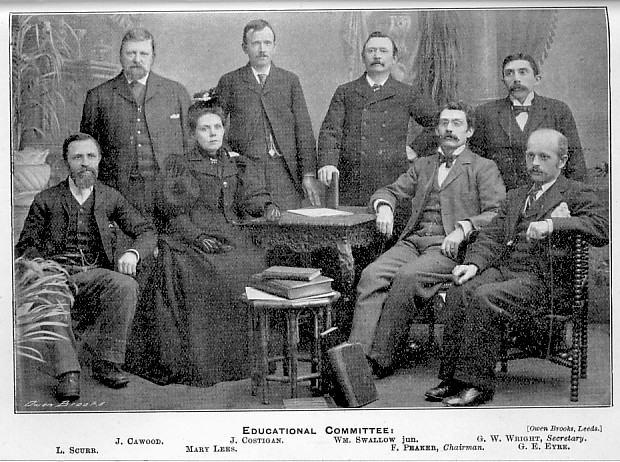
This chronicle of fifty years cannot be concluded in more striking
words than those of the directors as expressed in their report:
"We
cannot take stock of our surroundings to-day without feeling that
the splendid position we have attained is a matter for mutual and
sincere congratulation. We may well stand amazed at the progress
which has been made in the past, and it is impossible to predict
what the Society may yet become. With 37,000 members, doing a trade
over a £1,000,000 a year, making a profit of £150,000 per annum, with
a capital of £485,000, and the accumulated experience of fifty
years—no limit can be fixed to its possible future development and
usefulness so long as the members have faith in each other and stand
firmly by the true principles of co-operation."
The Leeds pioneers have wandered for fifty years in the wilderness
of industry to some purpose, and profits like a pillar of cloud by
day and a pillar of fire by night have never ceased to guide them on
their way, and still nobler lights of another kind have shone upon
their path, by which they have honourably profited.
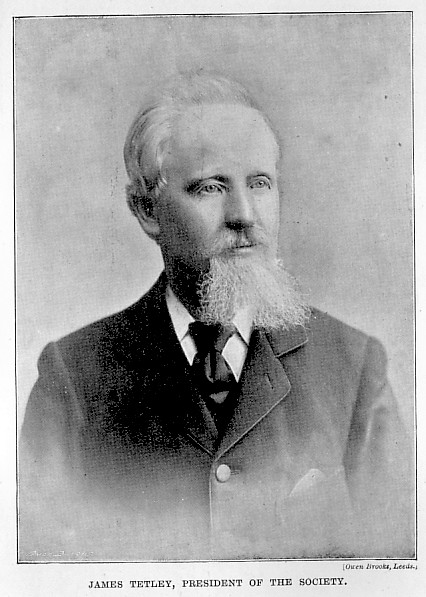
On the preceding page we give the portrait of Mr. James Tetley, who
will have the good fortune to be known as the Jubilee President, and
happily witnesses the triumph of the Society whose interests he has
so ably and strenuously promoted. |